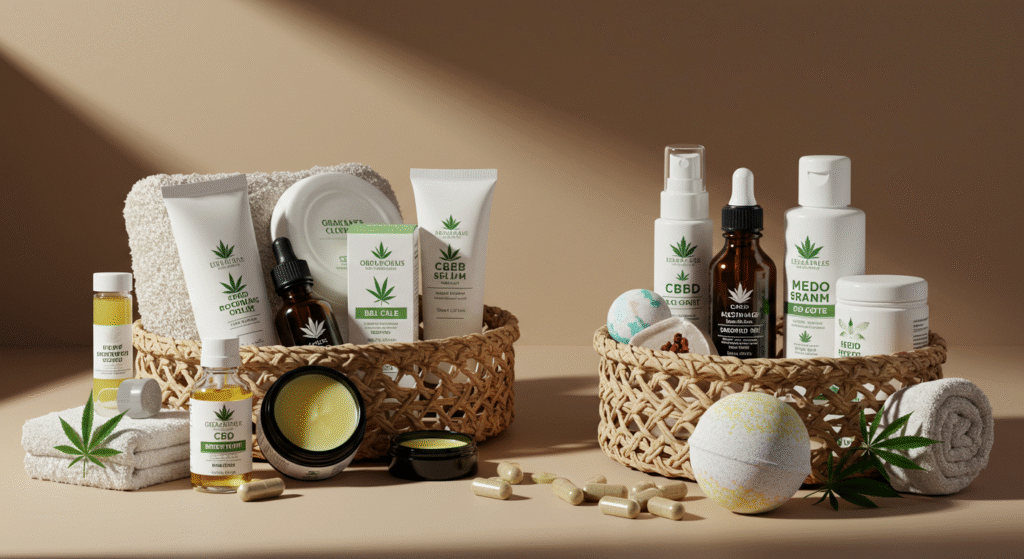
The wellness industry has witnessed few phenomena as remarkable as the rise of cannabidiol, commonly known as CBD. The growing popularity of CBD wellness products reflects a broader shift toward natural remedies and alternative approaches to health and wellbeing. From oils and tinctures to edibles and topicals, CBD has moved from obscurity to mainstream acceptance in just a few years, appearing on pharmacy shelves, health food stores, and even high street retailers across the UK.
For those exploring quality options, organic cbd oil products offer transparency and purity that matter when choosing supplements. Understanding what real users experience helps set realistic expectations, which is why reading resources like orange county cbd review provides valuable insights into product effectiveness and user satisfaction.
Understanding CBD: The Basics
CBD is one of over 100 cannabinoids found in cannabis plants, but unlike its more famous cousin THC (tetrahydrocannabinol), it doesn’t produce intoxicating effects. This crucial distinction has enabled CBD’s legal status in many countries and its acceptance as a wellness product rather than a recreational substance. CBD interacts with the body’s endocannabinoid system, a complex network of receptors involved in regulating various physiological processes.
The endocannabinoid system influences mood, sleep, immune response, pain perception, and inflammation. This wide-ranging influence explains why people report using CBD for such diverse purposes. While research is still catching up with public enthusiasm, preliminary studies and anecdotal reports suggest CBD may support wellbeing in multiple ways, though it’s not a cure-all despite sometimes being marketed that way.
The Legal Landscape in the UK
UK law permits CBD products containing less than 0.2% THC, and they must be derived from approved industrial hemp strains. These regulations ensure CBD products won’t produce psychoactive effects while allowing access to potential wellness benefits. However, the regulatory framework continues evolving, with authorities working to establish clearer guidelines for manufacturing, labeling, and marketing CBD products.
In 2021, the Food Standards Agency classified CBD as a novel food, requiring products to undergo safety assessments and authorization. This regulatory tightening aims to protect consumers by ensuring products are safe and accurately labeled. Reputable brands welcome this oversight as it helps eliminate questionable products and builds consumer confidence in the legitimate CBD market.
Quality and Safety Standards
Not all CBD products meet the same quality standards. Third-party lab testing is essential for verifying CBD content, confirming THC levels remain within legal limits, and screening for contaminants like pesticides, heavy metals, and residual solvents. Reputable manufacturers provide certificates of analysis (COAs) that document these test results, offering transparency about exactly what’s in the bottle.
Look for products made from organically grown hemp, as cannabis plants readily absorb contaminants from soil. Extraction methods also matter – CO2 extraction is considered the gold standard, producing pure CBD without chemical residues. Full-spectrum products contain other beneficial compounds from the hemp plant, while isolates contain only CBD. Broad-spectrum products offer a middle ground with multiple compounds but no THC.
How People Use CBD for Wellness
The growing popularity of CBD wellness products stems from diverse applications people have discovered. Many use CBD for stress management and relaxation, reporting it helps them feel calmer without sedation or impairment. While research on CBD for anxiety is still emerging, some studies suggest it may influence serotonin receptors and other pathways involved in mood regulation.
Sleep support represents another common use case. People struggling with occasional sleeplessness report that CBD helps them relax and fall asleep more easily. The mechanism isn’t fully understood, but CBD may address underlying issues like anxiety or discomfort that interfere with sleep. Effects vary considerably between individuals, with some finding dramatic benefits while others notice little change.
Pain and Inflammation Management
CBD has been studied for its potential anti-inflammatory properties and effects on pain perception. Some people with chronic discomfort report that CBD helps them manage symptoms, though scientific evidence remains limited. The anti-inflammatory effects observed in laboratory and animal studies may translate to benefits for humans, but more research is needed to establish optimal dosing and effectiveness for specific conditions.
Topical CBD products offer targeted application for localized discomfort. These products are absorbed through skin rather than entering the bloodstream systemically, potentially providing relief to specific areas. Athletes and active individuals often use CBD topicals for post-workout recovery, reporting reduced muscle soreness and faster recovery times, though placebo-controlled studies are still limited.
Different Forms of CBD Products
CBD oils and tinctures remain the most popular format, offering flexibility in dosing and relatively quick absorption when taken sublingually (under the tongue). Holding oil under your tongue for 60-90 seconds before swallowing allows cannabinoids to absorb directly into your bloodstream through mucous membranes, bypassing digestion for faster effects. This method provides efficient delivery and allows for precise dose adjustments.
Capsules and softgels offer convenience and consistent dosing without measuring drops. They’re ideal for people who prefer standardized amounts or dislike the taste of hemp. Absorption is slower than sublingual administration since capsules must pass through the digestive system, but effects may last longer once they kick in.
Edibles, Beverages, and Alternative Delivery Methods
CBD edibles like gummies have gained tremendous popularity, offering enjoyable consumption methods with precise dosing. Like capsules, edibles are processed through digestion, meaning effects take 30-90 minutes to appear but potentially last several hours. The delayed onset and longer duration make edibles suitable for sustained support rather than acute situations requiring quick relief.
CBD beverages are emerging as another convenient option, with infused waters, teas, and coffee products appearing on market shelves. These products offer hydration alongside CBD consumption, though ensuring proper emulsification for consistent dosing presents technical challenges manufacturers are still refining.
Vaping CBD provides the fastest absorption and quickest effects, but raises health concerns about lung exposure to vaporized substances. Most health experts suggest alternatives to vaping when possible, particularly given uncertainties about long-term effects of inhaling various compounds.
Dosing Considerations and Finding What Works
One challenge with CBD is the lack of standardized dosing guidelines. Optimal amounts vary considerably based on body weight, metabolism, individual endocannabinoid system characteristics, and what you’re trying to address. Most experts recommend starting low (5-10mg daily) and gradually increasing until you notice desired effects, a approach called “start low and go slow.”
Patience is essential – CBD effects may be subtle initially and build with consistent use. Some people notice changes within days, while others require several weeks of regular consumption. Keeping a simple journal noting doses, timing, and effects helps identify patterns and optimal dosing for your individual needs.
Factors Affecting CBD Absorption and Effectiveness
Bioavailability – how much CBD actually enters your bloodstream – varies significantly by delivery method. Sublingual administration offers relatively high bioavailability, while oral consumption through capsules or edibles has lower bioavailability due to first-pass metabolism in the liver. Taking CBD with fatty foods can enhance absorption since cannabinoids are fat-soluble.
Body weight, metabolism, and individual biochemistry influence how you process CBD. Two people taking identical doses may have quite different experiences. This variability isn’t a flaw in the products but reflects natural human diversity. Finding your optimal dose requires personal experimentation within safe guidelines.
The Entourage Effect and Full-Spectrum Products
The growing popularity of CBD wellness products has sparked interest in the “entourage effect” – the theory that cannabinoids, terpenes, and other compounds in hemp work synergistically, producing greater benefits together than CBD alone. Full-spectrum products contain the complete profile of compounds from hemp plants, including trace amounts of THC (under legal limits), other cannabinoids, and aromatic terpenes.
Many users report preferring full-spectrum products, finding them more effective than CBD isolates. However, people subject to drug testing should be aware that full-spectrum products containing trace THC could potentially trigger positive results, though this risk is generally low with quality products containing minimal THC levels.
Broad-Spectrum and Isolate Options
Broad-spectrum products offer a middle ground, containing multiple hemp compounds but with THC completely removed. These products may provide some entourage effect benefits without any THC concerns. CBD isolate, containing 99% pure CBD with no other cannabinoids or terpenes, suits people wanting to avoid all other hemp compounds or who need absolute certainty about consuming only CBD.
Each option has merits, and choosing between them depends on personal preferences, specific goals, and practical considerations like drug testing. Experimentation may be necessary to determine which type works best for your individual situation.
Potential Side Effects and Safety Considerations
CBD is generally well-tolerated with a favorable safety profile, but some people experience side effects. The most commonly reported include dry mouth, drowsiness, changes in appetite, and digestive upset. These effects are typically mild and often resolve as your body adjusts. Starting with low doses and increasing gradually minimizes the likelihood of uncomfortable side effects.
CBD can interact with certain medications, particularly those metabolized by liver enzymes. If you take prescription medications, consult your healthcare provider before starting CBD, as it may affect how your body processes other drugs. This is especially important for medications with narrow therapeutic windows where small changes in blood levels could matter.
Who Should Avoid or Use Caution with CBD
Pregnant and breastfeeding women should avoid CBD due to insufficient safety data. People with liver conditions should consult healthcare providers, as some studies suggest high doses might affect liver function. Those with low blood pressure should use caution, as CBD may lower blood pressure further in some individuals.
Children and adolescents generally shouldn’t use CBD products except under medical supervision for specific conditions. The developing brain may be more vulnerable to effects we don’t yet fully understand. Despite CBD’s popularity, we’re still learning about long-term effects, warranting a cautious approach for vulnerable populations.
Separating Marketing Hype from Reality
The growing popularity of CBD wellness products has unfortunately attracted some opportunistic marketing making exaggerated or unsubstantiated claims. While CBD shows promise for various applications, it’s not a miracle cure for every ailment. Companies making specific medical claims without FDA/MHRA approval violate regulations and should raise red flags about their credibility.
Realistic expectations are crucial for satisfaction with CBD products. It works subtly for most people rather than producing dramatic, immediate effects. Those expecting pharmaceutical-level results from wellness products often end up disappointed. CBD is best viewed as supportive tool for overall wellbeing rather than treatment for medical conditions, which require professional healthcare guidance.
Red Flags in CBD Marketing
Be skeptical of products claiming to cure diseases, those with prices far below market rates, or brands without third-party testing documentation. Exaggerated testimonials, pressure tactics, and lack of transparent information about sourcing and manufacturing also indicate potentially problematic products. Legitimate brands provide detailed information, test results, and realistic descriptions of what customers might expect.
The CBD market’s rapid growth has attracted both dedicated wellness companies and opportunistic sellers. Doing research, reading reviews from multiple sources, and choosing established brands with reputations to protect helps avoid inferior or misrepresented products.
Cost Considerations and Value Assessment
Quality CBD products require investment, with prices varying widely based on concentration, volume, and product type. When comparing costs, calculate price per milligram of CBD rather than just looking at bottle prices. A more expensive product may actually offer better value if it contains significantly more CBD. Cheaper products often cut corners on quality, testing, or use inferior hemp sources.
Consider CBD an investment in wellbeing rather than an expense. If it genuinely improves your quality of life – helping you sleep better, manage stress more effectively, or support recovery – the cost becomes more justifiable. However, if you’re not noticing benefits after giving it a fair trial at appropriate doses, discontinuing use and exploring alternatives makes more financial sense than continuing indefinitely out of hope it might eventually work.
The Future of CBD Research and Regulation
The growing popularity of CBD wellness products has spurred increased research interest. Clinical trials are investigating CBD’s potential for various applications, from anxiety and sleep disorders to inflammation and neuroprotection. As evidence accumulates, we’ll gain clearer understanding of optimal uses, dosing protocols, and which benefits are scientifically supported versus anecdotal.
Regulatory frameworks continue evolving to provide consumer protection while allowing access to potentially beneficial products. Expect continued tightening of manufacturing standards, clearer labeling requirements, and elimination of products making unsubstantiated health claims. These changes benefit consumers by creating more reliable, trustworthy marketplaces for CBD products.
Integration with Conventional Healthcare
Some healthcare providers now incorporate CBD discussions into patient care, recognizing that many people use these products independently. As research evidence grows and regulatory frameworks stabilize, CBD may become more integrated into conventional healthcare approaches for specific applications. However, this integration requires continued research establishing safety profiles, efficacy for specific conditions, and optimal dosing protocols.
The relationship between alternative wellness approaches and conventional medicine continues evolving. CBD represents one area where these worlds increasingly intersect, with potential for complementary use that respects both evidence-based medicine and individuals’ desires for natural wellness support options.
Making Informed CBD Choices
Navigating the CBD marketplace requires informed decision-making. Start by identifying your specific goals – stress management, sleep support, discomfort relief, or general wellness. Research products specifically formulated for those purposes, as concentration and formulation vary. Read reviews from multiple sources, but remember individual experiences vary widely.
Verify third-party testing, confirm organic sourcing when possible, and understand whether full-spectrum, broad-spectrum, or isolate best suits your needs. Start with moderate-quality products from reputable brands rather than either cheap options or ultra-premium products – you can always adjust later based on results. Keep expectations realistic and give products adequate trial periods (3-4 weeks minimum) before concluding whether they work for you.
Working with Healthcare Providers
If you have health conditions or take medications, discuss CBD use with your healthcare provider. While some doctors remain skeptical due to limited research, many appreciate being informed about everything you’re taking. This communication ensures they can monitor for potential interactions and provide guidance on whether CBD might complement your overall health management strategy.
Healthcare providers increasingly recognize that patients will use CBD regardless of their approval, making open discussion more productive than prohibition. Bringing product labels and dosing information to appointments facilitates informed conversations about potential benefits, risks, and how CBD fits into your broader health picture.
Personal Responsibility and Informed Use
The growing popularity of CBD wellness products reflects consumer desire for natural, accessible wellness support. However, this popularity doesn’t absolve individuals from responsibility for informed decision-making. Research products thoroughly, start conservatively with dosing, monitor your responses, and adjust based on results. Avoid viewing CBD as replacement for necessary medical care, healthy lifestyle practices, or professional mental health support when needed.
CBD works best as one component of comprehensive wellness approaches that include proper nutrition, regular physical activity, adequate sleep, stress management, and meaningful social connections. It’s a tool that may enhance overall wellbeing rather than a standalone solution for complex health challenges. Maintaining this perspective helps integrate CBD sensibly into balanced, holistic approaches to health and wellness that serve long-term thriving.
Frequently Asked Questions
Will using these products make me feel high or intoxicated?
No, legitimate products contain less than 0.2% THC, which isn’t enough to produce intoxicating effects. CBD itself doesn’t cause the “high” associated with cannabis because it doesn’t bind to cannabinoid receptors in the same way THC does. Users typically report feeling relaxed or experiencing reduced anxiety without any impairment of cognitive function or motor skills. If you feel intoxicated after using a product labeled as CBD, it likely contains undisclosed THC and should be discontinued.
How long does it take to notice effects, and how long do they last?
Timing varies by consumption method and individual factors. Sublingual oils typically produce effects within 15-45 minutes lasting 4-6 hours. Capsules and edibles take 30-90 minutes to work but may last 6-8 hours or longer. Topical products affect local areas within minutes to hours without entering bloodstream. Some effects, particularly for stress or sleep support, may build gradually over days or weeks of consistent use rather than appearing immediately.
Can I fail a drug test from using legal products?
Full-spectrum products containing trace THC could theoretically trigger positive drug tests, though risk is low with quality products at recommended doses. If you’re subject to drug testing with zero-tolerance policies, choose broad-spectrum or isolate products with no THC. Always purchase from reputable brands providing third-party testing certificates confirming THC content. If drug testing is a concern, broad-spectrum or isolate options eliminate this risk entirely.
What’s a reasonable starting dose for someone new to these products?
Most experts recommend starting with 5-10mg daily and maintaining that dose for at least a week while observing effects. If no benefits appear, increase by 5-10mg increments weekly until you notice desired effects or reach approximately 50-70mg daily. Some people find relief at low doses (10-20mg) while others require higher amounts (50-100mg+). Individual variation is significant, so patient experimentation is necessary to find your optimal dose.
Are these products safe to use long-term on a daily basis?
Current evidence suggests daily use is generally safe for most adults, with many people using these products continuously for months or years without apparent harm. However, long-term safety data beyond a few years is still limited since widespread use is relatively recent. Some experts recommend occasional breaks to prevent potential tolerance or dependency, though physical dependence on CBD appears unlikely. Consulting healthcare providers for personalized guidance makes sense for long-term use, particularly if you have health conditions.
Why do some people report dramatic benefits while others notice nothing?
Individual responses vary tremendously based on genetics affecting endocannabinoid system function, metabolism, body weight, specific health concerns being addressed, product quality, and dosing. Some people have naturally underactive endocannabinoid systems that respond strongly to supplementation, while others have well-functioning systems showing less dramatic response. Product quality varies significantly, and many people simply don’t use adequate doses for sufficient duration. These factors combine to create widely varying user experiences.
Can I give these wellness products to my pets?
Veterinary CBD products formulated specifically for pets exist, but human products aren’t always appropriate for animals due to concentration differences and potential ingredients toxic to pets. Some veterinarians recommend CBD for animals with anxiety, pain, or other issues, while others remain skeptical due to limited research. Never give animals human products without veterinary guidance, especially those containing xylitol or other ingredients harmful to pets. If considering CBD for pets, consult a veterinarian and use products specifically formulated for animals.
Do these products interact with alcohol or other substances?
CBD may intensify alcohol’s sedative effects, potentially increasing drowsiness or impairment. Using both together requires caution and moderation. CBD can interact with various medications by affecting liver enzymes that metabolize drugs. Common interactions involve blood thinners, some antidepressants, and medications with grapefruit warnings. Always inform healthcare providers about CBD use, especially if you take prescription medications. Combining CBD with other supplements or herbs also warrants caution and professional guidance.
What’s the difference between hemp and marijuana-derived products?
Both come from cannabis plants, but hemp is specifically cultivated to contain minimal THC (under 0.2% in the UK) and higher CBD. Marijuana strains are bred for higher THC content. Legally available wellness products are hemp-derived, ensuring they won’t produce intoxication. Chemically, CBD molecules are identical regardless of plant source, but full-spectrum products differ in their complete cannabinoid profiles. Hemp-derived products are legal in the UK while marijuana-derived products with significant THC remain controlled substances.
Should I be concerned about product quality if I buy from online retailers?
Online purchasing is perfectly safe if you choose reputable retailers and brands. Look for detailed product descriptions, third-party lab test certificates, customer reviews, and clear contact information. Avoid marketplaces or sellers offering suspiciously low prices or making exaggerated health claims. Established online health retailers often provide better selection and competitive pricing than physical stores. The key is researching brands thoroughly rather than impulsively purchasing from unknown sellers advertising unrealistic benefits.


